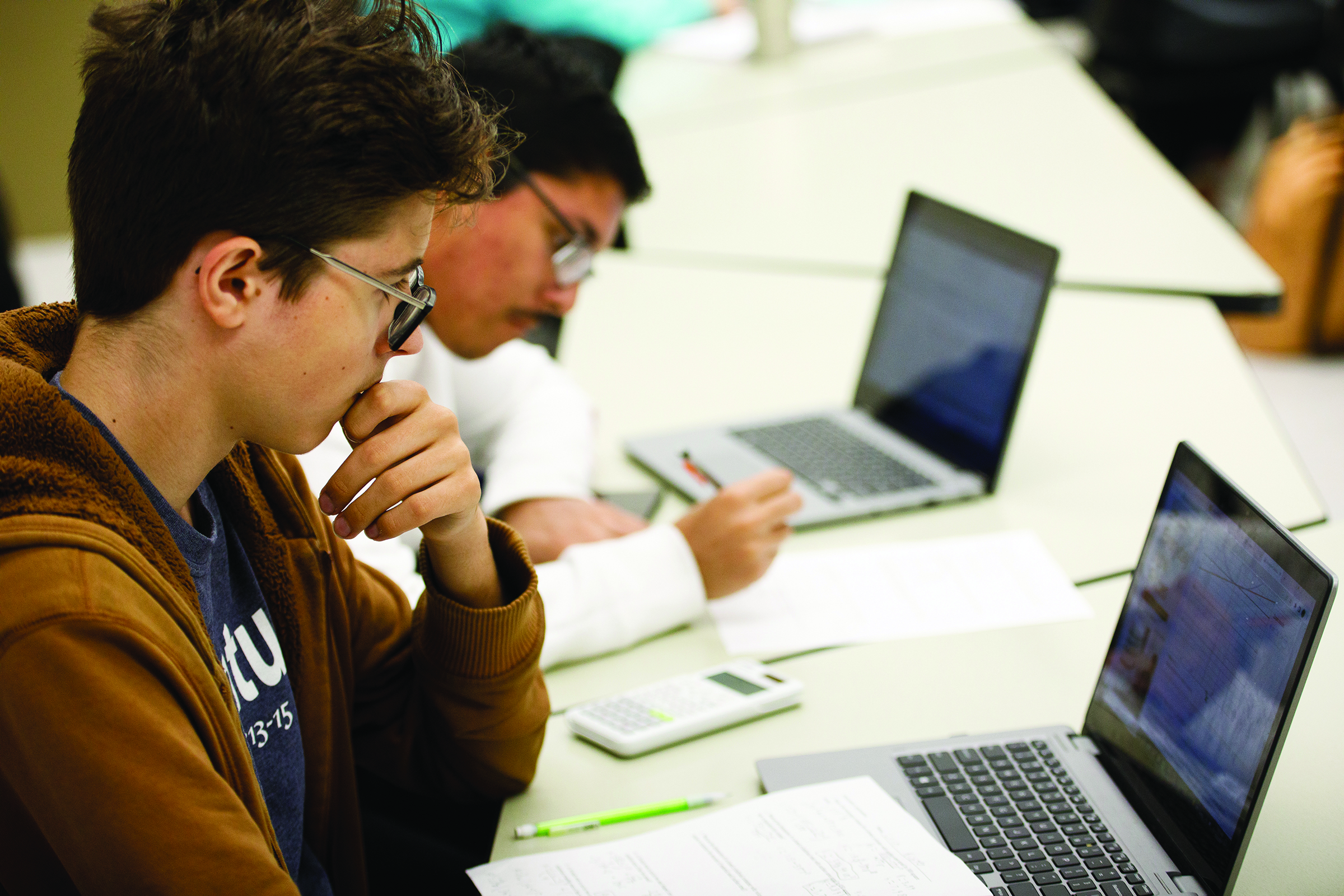DC3 Math Program to Change to ‘Corequisite Model’
Published April 14, 2023

In this file photo, Colin Richter (front left), a freshman from Dodge City, and Angel Orozco Macias, a dual-credit student from Dodge City, work on an in-class math activity on Oct. 6, 2022. Next semester, DC3 will transition its mathematics program from a developmental model to a corequisite model, which will better prepare students for math classes that pertain to their areas of study. [Photo by Gavin Peters]
This fall, Dodge City Community College (DC3) will be switching its mathematics program to a corequisite math model.
The project, which internally has been dubbed “DC3 CONQuers Math,” officially began in October 2022 as a proactive response to future changes the Kansas Board of Regents (KBOR) will make regarding the state’s mathematics curriculum. Among KBOR’s initiatives will be new math pathways and the elimination of developmental math courses taught at the college level.
“KBOR’s goal is for all students to be taking—as their first math course—a college-level math course that directly relates to their area of study,” Stephanie Gruver, DC3 Professor of Mathematics said. “This will allow students to move more quickly through their math courses than our current developmental model, while giving them the opportunity for support in those courses. It will also save them money as they do not have to pay for the supplemental classes that do not count toward their graduation credits.”
Gruver, who serves as the math project’s liaison, said the new corequisite model will initially involve two classes: Modern College Math (MATH 101) and College Algebra (MATH 106).
“Students will have the option of enrolling in a 2-hour, 0-credit supplemental lab course that will coincide with their paired course that will be graded as pass/fail,” she said. “The supplemental lab courses will provide just-in-time instruction and review of the current topics being covered in the parent course.”
“Just-in-time” instruction refers to the idea that instead of preloading the prerequisite material at the beginning of the semester, it will be spread throughout the course and will be used at the moment the student needs to apply it to the material in the credit-bearing course.
And another aspect of the new model is that students will be comingled in the credit-bearing course, which means there will be students of varying preparations sitting beside one other in the same class.
“An advantage to comingling is that students who need extra help also will have peers in their class who can help them as well,” Gruver said.
Regarding placement, she said students will be placed in their first college credit-bearing math course through guided self-placement, which is a tool that is housed on the dc3.edu website at various locations.
“Mainly, it can be found within the MyDC3 student portal of our website. But, it also can be found on both the course search page and within the student tab,” she said. “The guided self-placement tool will make recommendations to the student regarding course enrollment and the corequisite option. In addition, faculty in the credit-bearing course also will do an assessment of student placement during the first week of class.”
Analysis of corequisite math course completion rates show that students are more likely to complete a college-level mathematics course under this model, unlike those who take the traditional developmental mathematics sequence, she said.
Gruver said the college’s overall goal for the math redesign is to “increase the percentage of students who pass their first transferable college-level math course within their first academic year.”
DC3 Vice President of Academic Affairs, Dr. Jane Holwerda, said developing this change in curriculum has been an amazing process and project for the college and its students.
“When data clearly demonstrated that our sequence of introductory math courses was an obstacle to student success, our college committed to doing math better,” she said.
However, Holwerda said this change would not have been possible without the support of DC3’s Board of Trustees and President Dr. Harold Nolte—and the help of many faculty and staff members from Academics, Advising, Athletics, Enrollment, Tutoring, the Business Office, and more.
“I want to shout out, and loudly, my appreciation for faculty members—Stephanie Gruver, Dylan Faullin, Sherry Curtis Rogers, and Math Lab Coordinator Russ Rickers—for their hard work and long hours,” she said. “DC3 has the best faculty ever.”
Although the college is still finalizing details for its August 2023 implementation of the corequisite model—and is still looking at possible math platforms and the features they offer—changes to prerequisites in both math and chemistry course descriptions already have been made to reflect the college’s updated course offerings.
“We will be the first community college in the state to move to the corequisite model,” Gruver said. “By being the first, we will be a step ahead of the other community colleges when KBOR implements the changes at the state level, which will allow us to move into the math pathways without having to readjust our curriculum.”
In addition, she said DC3’s proactive transition to the corequisite model will help with student retention.
“The barrier for many students in receiving a college degree is getting through a college-level math class,” she said. “The corequisite model has been shown to be more successful in helping students through their college-level math courses than traditional developmental math models.”
By Lance Ziesch
DC3 Assistant Director of Marketing and Community Relations